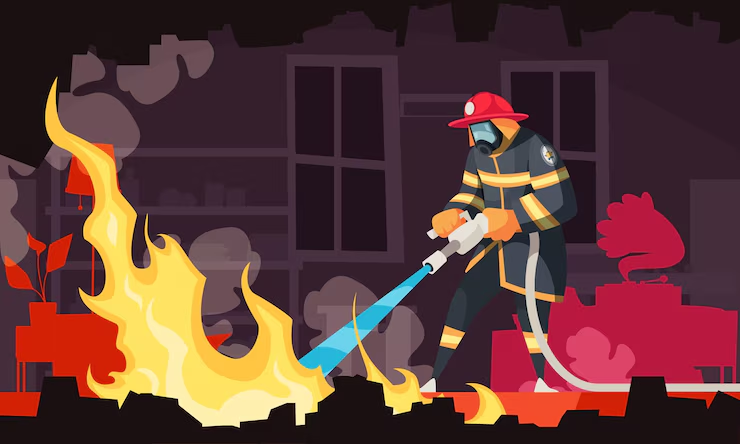Text & media
Introduction: Why Fire Watch Services Matter More Than Ever
In an era of increasing fire hazards, from faulty wiring to industrial mishaps, the role of Fire Watch Guards has become paramount in safeguarding properties. Fire watch services are not just regulatory requirements; they are essential risk mitigation tools that protect lives, investments, and reputations. Whether you own a commercial facility, a construction site, or a residential complex, implementing effective fire watch protocols can mean the difference between safety and devastation.
This guide offers ten crucial tips to help you get the most out of your fire watch program, ensuring your property remains compliant, secure, and prepared.
1. Understand Fire Watch Compliance Requirements
Before hiring a fire watch team, ensure you understand the local fire codes and OSHA requirements . These guidelines dictate when a fire watch is necessary, such as during hot work operations or when fire protection systems are down. Non-compliance can lead to severe penalties and liabilities.
Tip: Consult with your local fire marshal or a certified fire safety consultant to stay updated on evolving regulations.
2. Hire Licensed and Trained Fire Watch Guards
Not all security guards are trained in fire watch protocols. It’s critical to work with certified personnel who have specific training in fire safety, alarm response, and evacuation procedures.
Verify licenses and credentials.
Ask for proof of fire safety training.
Ensure guards are experienced with your type of facility (e.g., high-rise, warehouse, construction site).
This ensures quick action during emergencies and proper documentation for compliance purposes.
3. Conduct a Thorough Fire Risk Assessment
A tailored fire risk assessment helps identify specific hazards within your property. According to NFPA, risk assessments are the cornerstone of any robust fire prevention plan.
Key areas to assess:
Electrical installations
Flammable materials
Blocked exits
Unattended hot work zones
Use this data to guide patrol routes, assign duties, and ensure coverage of vulnerable zones.
4. Develop a Site-Specific Fire Watch Plan
Avoid generic fire watch procedures. Create a custom plan that aligns with the structure, size, and operations of your facility.
Include:
Checkpoint maps
Contact numbers
Emergency shutoff instructions
Evacuation routes
Keep this plan accessible at guard stations and ensure all fire watch personnel are trained on it.
5. Equip Guards with the Right Tools
Provide your Fire Watch Guards with reliable equipment to ensure effective patrols and emergency responses.
Essentials include:
Two-way radios
Fire extinguishers
Flashlights
Notebooks or digital reporting tools
Also, ensure guards wear appropriate protective gear, especially on construction or industrial sites.
6. Maintain a Detailed Fire Watch Log
Documentation is vital for compliance and incident investigation. Maintain a log that includes:
Time of patrols
Name of the guard on duty
Issues observed
Corrective actions taken
These records are often required during audits or insurance claims and serve as proof of due diligence.
Pro Tip: Use digital apps for real-time reporting and timestamped logs to improve transparency.
7. Monitor Fire Suppression and Alarm Systems
Fire watch services often fill the gap when these systems are offline. But it’s crucial to monitor the status and arrange for timely repairs to minimize reliance on manual patrols.
Ensure guards:
Check system panels during each round
Report any system failures immediately
Collaborate with fire system technicians onsite
This integrated approach ensures nothing falls through the cracks.
8. Perform Random Spot Checks and Audits
Routine patrols can become monotonous. To prevent complacency:
Conduct unannounced inspections.
Use GPS tracking to confirm patrol paths.
Have supervisors review logs daily.
Auditing your fire watch program ensures accountability and identifies areas for improvement.
9. Train Staff on Fire Watch Protocols
Your fire watch team isn’t the only line of defense. Employees should also know how to:
Report hazards
Use extinguishers
Follow evacuation procedures
Host monthly fire drills and safety briefings. This culture of awareness enhances your overall fire preparedness.
Internal Resource: Learn more about how fire drills protect businesses.
10. Partner with a Reputable Fire Watch Company
Finally, choose a provider with a proven track record. Look for companies with:
24/7 availability
Rapid deployment capabilities
Excellent client reviews on platforms like Trustpilot or Google Reviews
Avoid cutting costs on fire protection. Investing in reputable services ensures peace of mind and superior protection.
Related: Our guide to choosing the best fire safety partner for your business.
Conclusion: Proactive Protection Is the Best Investment
Fires don’t wait for perfect conditions—they strike when systems fail or human error takes place. Proactive fire watch programs ensure you’re never caught off guard. By implementing these top 10 tips for Fire Watch Guards, you reduce risks, comply with legal standards, and safeguard both people and property.
In a world where every second counts, trained fire watch professionals are not just a precaution—they're your frontline defense.
Need help choosing a trusted Fire Watch Guard provider? Contact us for a consultation or read our full guide on fire safety planning for businesses.

